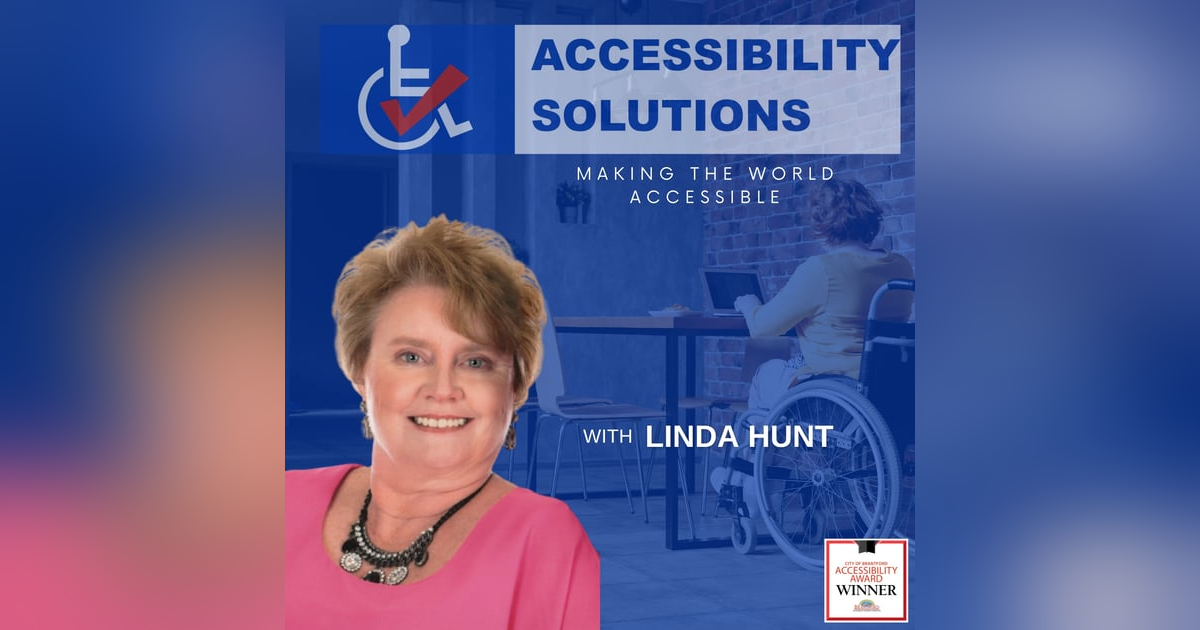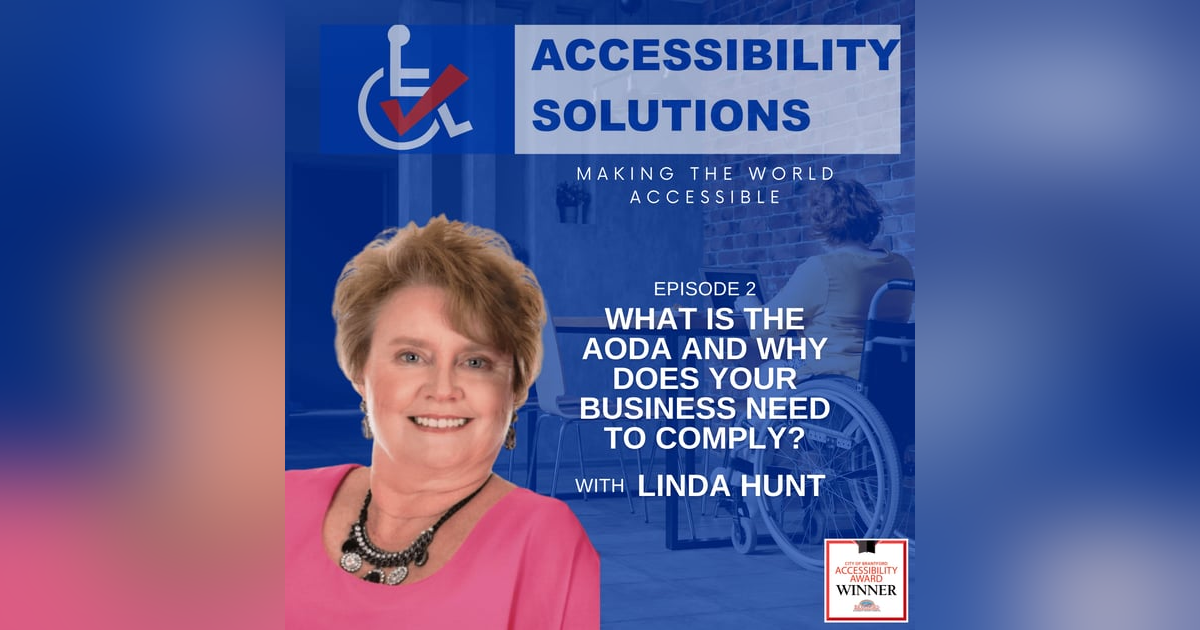
Sign up to get updates from us
By signing up, you agree to receive email from this podcast.

In this episode, Linda outlines the Accessibility for Ontarians with Disabilities Act (AODA), what the standards are, and how to comply. This legislation applies to every business with at least 1 employee in the Province of Ontario.
Five accessibility standards under the Accessibility for Ontarians with Disabilities Act (AODA) cover:
Connect with Us:
Website – www.solutions4accessibility.com
LinkedIn - https://www.linkedin.com/company/accessibility-solutions/
Facebook - https://www.facebook.com/solutions4accessibility
YouTube - https://www.youtube.com/channel/UCRBqblsq_vxrKbdvEp2IOWQ
About the Host:
Linda Hunt Is an Award-Winning Accessibility Consultant, Speaker and Author. She is the CEO of Accessibility Solutions and an Advocate for all things related to accessibility.
Linda is the Treasurer of Citizens with Disabilities – Ontario a member of the Rick Hansen Foundation Accessibility Professional Network and a Certified Community Champion on the United Nations Convention on the Rights of Persons with Disabilities and its Optional Protocol.
Linda first became a person with a disability in 2004 since then she has been an active and engaging speaker to groups on a variety of accessibility topics.
In addition, Linda is a business owner. Along with her husband Greg they have operated Grelin Apparel Graphics for over 30 years.
Thanks for listening!
It means so much to us that you listened to our podcast! If you would like to continue the conversation with us, connect with Accessibility Solutions on LinkedIn, Facebook or subscribe to the Accessibility Solutions YouTube channel. For a FREE 15- minute consultation to discuss how accessibility can improve your business bottom line visit www.solutions4accessibility.com. Or email Linda directly linda@solutions4accessibility.com
With this podcast, we are building an engaged community that we hope to inspire to Make the World Accessible. If you know somebody who would benefit from this message, or would be an awesome addition to our community, please share it using the social media buttons on this page.
Do you have some feedback or questions about this episode? Leave a note in the comment section below!
Subscribe to the podcast
If you would like to get automatic updates of new podcast episodes, you can subscribe on the podcast app on your mobile device.
Leave us a review
We appreciate every bit of feedback to make this a value-adding part of your day. Ratings and reviews from our listeners not only help us improve, but also help others find us in their podcast app. If you have a minute, an honest review on iTunes goes a long way! Thank You!!
You are listening to Accessibility Solutions. If you're a business looking to improve your bottom line, then you're in the right place. In the show, we'll discuss how making the world accessible is great for business and the economy. My name is Linda Hunt. And I am an award winning accessibility consultant, speaker and author, and a longtime advocate for all things related to accessibility. Thank you for joining me. So let's get started.
Linda Hunt:Hello, and thanks for joining us this week. This week's topic is the Accessibility for Ontarians with Disabilities Act, otherwise known as the AODA and we're going to talk about why your business must comply with this legislation. The Accessibility for Ontarians with Disabilities Act was enacted in 2005 by the Government of Ontario. And this act lays the framework for the development of province wide mandatory standards on accessibility in all areas of daily life. The goal of this legislation was to make Ontario accessible for people with disabilities by 2025 that was giving 20 years for this standards to be developed and for the province of Ontario to be accessible. We are now partway through 2022. So with less than three years to go, we've really got a long way to go. In order to realize the goal of having an accessible province by 2025 22% of the population has a disability. In Ontario 15% of the population over the age of 15 has a disability, but 40% of the population over the age of 65 has a disability. So that number continues to rise as the population ages because there are more baby boomers every year. And as we as we just discussed 40% of those baby boomers identify as having a disability that affects their mobility, their vision, or their hearing. Creating a province where every person who lives or visits can participate fully makes good sense for our population, for our business, for our economies and for our communities in general.
Linda Hunt:What is accessibility? It simply means giving people of all abilities the opportunity to fully participate in everyday life. The Ontario legislation a Oda comprises of five standards and those standards are customer service, information and communications, transportation, the design of public spaces and employment. The EO da recognizes seven distinct categories of disabilities, which are hearing, intellectual or developmental learning, mental health, speech or language, physical or a mobility, disability, and vision. All of these disability categories are considered under the ADEA and those standards that are developed are applicable to all of these disabilities. The EO da and the standards under the EO da are applicable to every business with at least one employee in the province of Ontario. businesses with more than 20 employees 20 or more employees have additional requirements under the Act. Under the customer service standard, every business has an obligation to train their staff and their volunteers and to develop policies. They also have a requirement to file compliance reports with the province. The employment information and communication and transportation standard. were integrated to form the I A 's are regulation Integrated Accessibility Standard regulation.
Linda Hunt:There is a requirement for all businesses to develop policies considering accessibility when they're purchasing or designing self serve kiosks develop a feedback process for persons with disabilities and make that process accessible. When asked. They must make publicly available information accessible when asked. And again, there are requirements to file compliance reports. Under the IAS our general regulation, specifically when we're talking about employment, employing with people with disabilities, would really open up what is considered to be a significant labor shortage, as those baby boomers we just talked about are leaving the workforce. And there are not enough people coming into the workforce to fill these available spots. Persons with disabilities are the most overlooked pool of labor that exists. If persons with disabilities were given the opportunities to be employed by businesses, then the labor shortage would not be as significant as what we're seeing now. So the Accessibility for Ontarians with Disabilities Act has a requirement under employment that all employers make their employment practices more accessible, including recruitment, employee and accommodation, accommodations, performance management, career development, and redeployment. There's also an Ontario Human Rights requirement that employers must make reasonable accommodations as requested for employees who identify as having a disability. The transportation standard primarily applies to transportation providers, such as municipal transit systems, provincial transit systems, rail, airlines, buses, and that type of thing. So it doesn't necessarily apply to transportation from the average business perspective. The final standard is the design of public spaces. This standard talks about making new or redeveloped recreational trails and beaches. Their access routes must be accessible, new or redeveloped. off street parking lots must be accessible. Service counters to fix queuing guides, and waiting areas with fixed seating must also be made available to persons with disabilities.
Linda Hunt:To really summarize the AODA aims to make Ontario fully inclusive and accessible for people with disabilities concerning good services, facilities, accommodations, employment building structures and premises by 2025. The AODA applies to government not for profit private businesses with at least one employee and public sector organizations, which quite frankly, is almost everywhere that you go to shop to dine out to have services delivered, you know, going to your doctor or going to your dentist, any of that type of stuff all applies. So there are really no businesses that can say that the AODA is not applicable to them. The AODA legislation does have some teeth to it, there are the mechanisms in place for individuals and businesses to be fined. For individuals, it can be up to $50,000 per day and individuals up to $100,000 per day for violations of the AODA and there is a one 800 toll free number for reporting violations. And that number is 1-866-515-2025. We will put that number in the show notes for anyone that's interested. And I'd like to thank you again for joining me. Tune in next week, where we will be discussing the concept of fostering a culture of inclusion within your business shares.